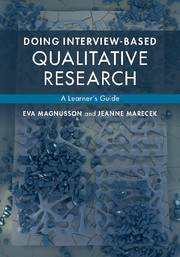Book contents
- Frontmatter
- Contents
- 1 Introduction
- 2 Some examples of interpretative research
- 3 Planning and beginning an interpretative research project
- 4 Making decisions about participants
- 5 Designing the interview guide
- 6 Doing the interview
- 7 Preparing for analysis
- 8 Finding meanings in people's talk
- 9 Analyzing stories in interviews
- 10 Analyzing talk-as-action
- 11 Analyzing for implicit cultural meanings
- 12 Reporting your project
- Epilogue
- References
- Index
Epilogue
Published online by Cambridge University Press: 05 October 2015
- Frontmatter
- Contents
- 1 Introduction
- 2 Some examples of interpretative research
- 3 Planning and beginning an interpretative research project
- 4 Making decisions about participants
- 5 Designing the interview guide
- 6 Doing the interview
- 7 Preparing for analysis
- 8 Finding meanings in people's talk
- 9 Analyzing stories in interviews
- 10 Analyzing talk-as-action
- 11 Analyzing for implicit cultural meanings
- 12 Reporting your project
- Epilogue
- References
- Index
Summary
In this epilogue, we offer our reflections on several features of interpretative research. We begin by considering how interpretative research is situated in relation to other scientific research. All scientific research is guided by theory, which gives the researcher a set of concepts and previous findings for thinking about the topics that are being studied. All good social research uses systematic methods of selecting participants for study, systematic methods for gathering material from them, and systematic and transparent procedures for analyzing that material. Also, there are common ethical standards for conducting a study and common standards for reporting the results of research.
Beyond the commonalities, each approach to research has distinctive features that are determined by its overarching framework. Let us briefly recap the overarching framework of interpretative research. To begin with, interpretative researchers think of people as always located in social contexts and as continually engaged in making sense of their experiences. Interpretative researchers seek to understand the meanings that people give to particular events and actions. They also want to know how those meanings arise in the cultural and social settings in which people live – how people arrive at meanings through their interactions with others and how they then make those meanings their own.
To accomplish their goals, interpretative researchers employ several distinctive procedures. These procedures set their research apart from, for instance, experimental research and survey research. We have found that some beginners are puzzled by certain procedures of interpretative research. We discuss four such procedures here: the use of semi-structured interviews, the use of purposive selection for composing study groups, the use of open researchable questions instead of a priori hypotheses, and the practice of refining and augmenting the researchable questions as the research unfolds.
Using semi-structured interviews
To learn about people's meaning-making, interpretative researchers rely on interviews in which they ask participants to tell about real-life relationships and situations. They ask participants to tell about their thoughts, intentions, reactions, and reflections, and how and for what reasons they made choices about how to act. When people agree to take part in such research interviews, they shoulder the task of explaining themselves to the interviewer – of making themselves understandable to an outsider who lacks local knowledge. Such interviews are therefore likely to be dense with clues about the participants' ways of seeing the world.
- Type
- Chapter
- Information
- Doing Interview-based Qualitative ResearchA Learner's Guide, pp. 178 - 181Publisher: Cambridge University PressPrint publication year: 2015



